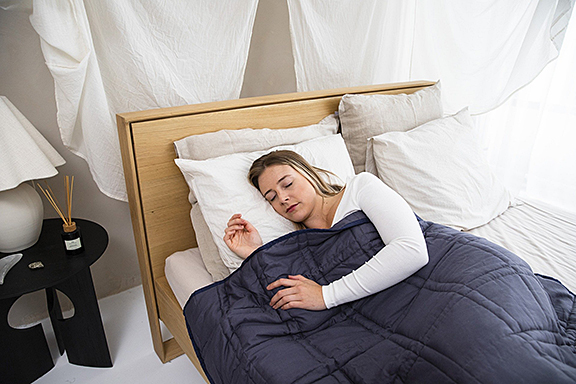You Probably Need More Sleep
Let’s talk about sleep. You’re probably not getting enough.
Adults need seven to nine hours of sleep per night. But more than a third of adults don’t even meet the minimum standard of proper sleep. One night of less-than-optimal sleep won’t affect much – other than perhaps your desire for coffee – but a pattern of not sleeping enough can have negative effects on your physical and mental health.

Why You Should Sleep More
I like to think of sleep as ground zero for well-being. You can’t achieve complete well-being without first getting consistent, quality sleep. Good sleep will improve your mental and physical health – and help you to reach your full potential. Here are a few benefits of good sleep:
1. Improved mood and mental health: Not getting enough sleep often makes people cranky. Even an extra hour a night will help you to better regulate your emotions and manage stress. And consistently getting good sleep is linked to lower rates of anxiety and depression.
2. Enhanced cognitive function and productivity: Sleep plays a critical role in memory, as well as the ability to learn new information. You’ll also have better focus and concentration, helping you to complete tasks with more efficiency. Additionally, you’ll make more sound decisions and solve problems when you’re feeling well-rested.
3. Better physical health: I know as an athlete that some of my workouts happen when I haven’t gotten enough sleep. No one wants to feel fatigued – and you’ll be able to complete everyday tasks better if you’re well-rested. On top of that, sleep strengthens your immune system, better protecting you from sickness.
Are You Sleeping Enough?
Here’s a chart from the National Institutes of Health about how much sleep everyone needs. This isn’t one-size-fits-all, but it’s a good starting point to make sure you’re at least meeting the minimum standard for quality sleep. (Extra tip: This is a helpful reference if you have children as well.)
Age Group
Recommended Hours of Sleep Per Day
Newborns (0 to 3 months) 14–17 hours
Infants (4 to 12 months) 12–16 hours per 24 hours (including naps)
Toddlers (1 to 2 years) 11–14 hours per 24 hours (including naps)
Preschoolers (3 to 5 years) 10–13 hours per 24 hours (including naps)
School Age (6 to 12 years) 9–12 hours per 24 hours
Teen (13 to 18 years) 8–10 hours per 24 hours
Adults (18 to 60 years) 7 or more hours per night
Adults (61 to 64 years) 7–9 hours
Adults (65 years and older) 7–8 hours
How to Start Getting More Sleep
It’s always hard to change your routine – even if it’s for the better. So here are some tips to start getting more sleep.
(Keep in mind that there’s a difference between getting enough hours of sleep and getting quality sleep. While you’re trying to get more hours, remember that if you’re not sleeping well, it’s not very helpful. So below are some tips for getting more sleep and improving the quality of your sleep.)
1. Get on a schedule: The best way to consistently get enough sleep is…well, do it consistently. That means that ideally you should be going to sleep at the same time and waking up at the same time daily. It doesn’t have to be exact, but if you’re trying to get nine hours a night, try going to bed around 10 o’clock and waking up at 7 o’clock.
2. Avoid technology before bed: Screens on smartphones and TVs emit blue light – this can delay your body’s production of melatonin, which helps promote sleep. Try to turn off all screens for at least half an hour before going to bed. I like reading a book before I go to sleep – or if you don’t like reading, you can meditate, take a bath, or talk with a friend or family member.
3. Create a good environment for sleep: Limit noise and light if possible before you go to bed, and make sure your bed is comfortable. In addition, try reserving your bed for sleep, not work – this’ll create an association between your bed and sleeping, making it easier to sleep when you lie down on your bed.
Though it may take time to adjust, the benefits are well worth the effort. Prioritizing sleep as a foundational part of your routine will lead to significant improvements in your mental and physical health. These tips provide a solid starting point for achieving better sleep and enhancing your overall well-being.
Sleep well!











